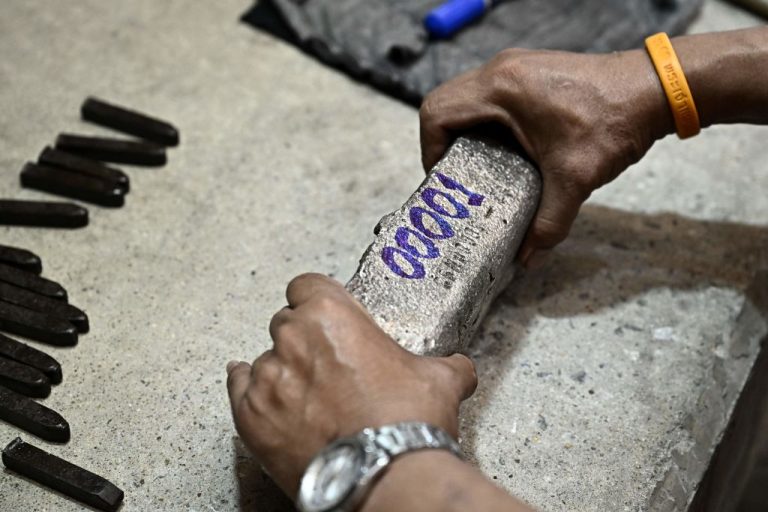Thailand police have arrested and charged six Chinese nationals for operating an alleged scheme selling fake gold to wealthy Chinese residents of Bangkok’s Chinatown.
Reports further allege those charged are members of a Chinese organized crime group.
Reported in the Bangkok Post on April 25 where Metropolitan Police Bureau (MPB) Chief of Investigation Teeradej Thumsutee told reporters that the individuals, ranging in age from 44 to 54, were arrested outside the Hua Lamphong train station.
Upon arrest, police seized as evidence:
- 179 fake gold bars
- 10 fake gold statues
- 8 thin sheets of real gold
- 24 ATM cards
- 12 mobile phones
- Goldsmithing tools
Photos supplied in the article of the haul from the bust show the counterfeit gold statues appear to be shaped in the form of the Budai Monk. The fake gold bars are crudely formed half-egg shaped chunks of gold.
Success
You are now signed up for our newsletter
Success
Check your email to complete sign up
Police say the suspects sold 10 million Thai baht ($292,500 USD~) worth of counterfeit gold to wealthy Thai-Chinese in the area and were named as members of a mafia called “Mangkorn Dragon,” also known as “Jiangxi Dragon.”
News website Coconuts Bangkok described the Jiangxi Dragon as a “Triad” and added that the weight of the seized counterfeit gold was close to 30 pounds, which would have been worth approximately $875,000 USD if it were genuine 24k gold.
MORE ON SOUTHEAST ASIA
- Does the Pandemic Target the CCP? International COVID Stats Following Return of Mainland Travelers Sheds Some Light
- Ancient African Secret to Purifying Gold with Glass
- 26 Members of Thailand’s Women’s Volleyball Team Test Positive After Taking China’s Sinovac Vaccine
- Communist China Using Water to Create Chaos at Home and Abroad
Bangkok Post reported that also seized in the bust were “46 books of a Chinese association in Thailand,” which appear from the photos to have characteristics consistent with various fronts of the Chinese Communist Party-operated United Front Work Department (UFWD).
In February, MPB Commissioner Thiti Saengsawang told Bangkok Post that an investigation into an alleged “Chinese businessman” and “suspected crime boss” charged with being a member of the Triad, a documented arm of the UFWD, was ongoing after police raided a club owned by the man and found that of 104 patrons who tested positive for drugs, 99 were Chinese nationals.
In the gold case, Thai police further told the media that those duped were targeted from a registry “detailing names of Thai-Chinese descendants” who were exploited via typical telephone scam methods.
Coconuts Bangkok said that police warned the public that the directory “contains names that could be used to find more victims,” that “people should be wary as meeting with potential scammers could prove fatal,” and that more members of the Triad remain at large.
The six arrested also allegedly previously worked as telephone scammers in Indonesia, according to their own admission during interrogation, the Bangkok Post stated.
During the sales pitch, the scammers claimed to operate a mining plot willing to unload their cache at discounted prices, and utilized real gold bars mixed in with the fake gold bars to show authenticity.
The accused would cut the real gold bar into small pieces for the targets to take to gold shops to verify authenticity.
After the targets paid and took possession of the fake gold, the scammers would vanish. Once the victims attempted to sell their wares, the shops would inform them their purchases were not genuine gold.
A second article on the topic on the Thailand-based Khaosod English website states that the scammers utilized the Indonesia-based call center to target their victims.
The accused were also said to “love scams and were inspired by an internationally known series on scams.”
Fool’s gold
The scam is not the first of its kind in Thailand. In 2017, three Serbians were arrested and charged after allegedly selling gold necklaces and other ornaments to gold shops, which later discovered their purchases were not genuine gold.
Website Pattaya Mail reported at the time that four shops were duped in the scheme.
One owner stated that although she tested an 18k gold chain sold to her for 45,000 baht ($1,315 USD~) and was sure it was real, she later discovered the core was silver.
The accused told police that they did not know the gold was fake and that “they were told by a friend back in Serbia that they could make a fortune from gold bought in Serbia and sold in Thailand.”
In 2015, a Bangkok local was arrested and charged with minting silver chains, plating them in gold, and selling the items as if they were authentic gold, Bangkok Post reported.
The man employed a 31-year-old woman to take the fraudulent wares to sell to various pawn shops. The woman was allegedly his neighbor and was paid 1,000 baht ($29 USD~) per item sold.
Rogue dangers
On April 4, Coconuts Bangkok reported that three Chinese nationals were arrested by Chinese police in Wuhan after charges were pressed in Thailand after a 22-year-old Chinese girl was “abducted, tortured and ultimately murdered” when her family refused to pay a 2.5 million baht ($73,000 USD~) ransom.
“Thai police also detained a 19-year-old woman they believe aided the men. She told police that the men frequented the karaoke bar where she worked and that she advised them on how to carry out the kidnapping,” Coconuts Bangkok stated.
The article added that after the girl refused to have sex with the kidnappers, they stabbed her multiple times in the chest and shoulders before strangling her. The body was dumped into a canal near a banana plantation before the men fled Thailand for China, the article added.
The article states that the men would not be exported to Thailand to face prosecution, but would instead be handled in mainland China under the Communist Party.

















